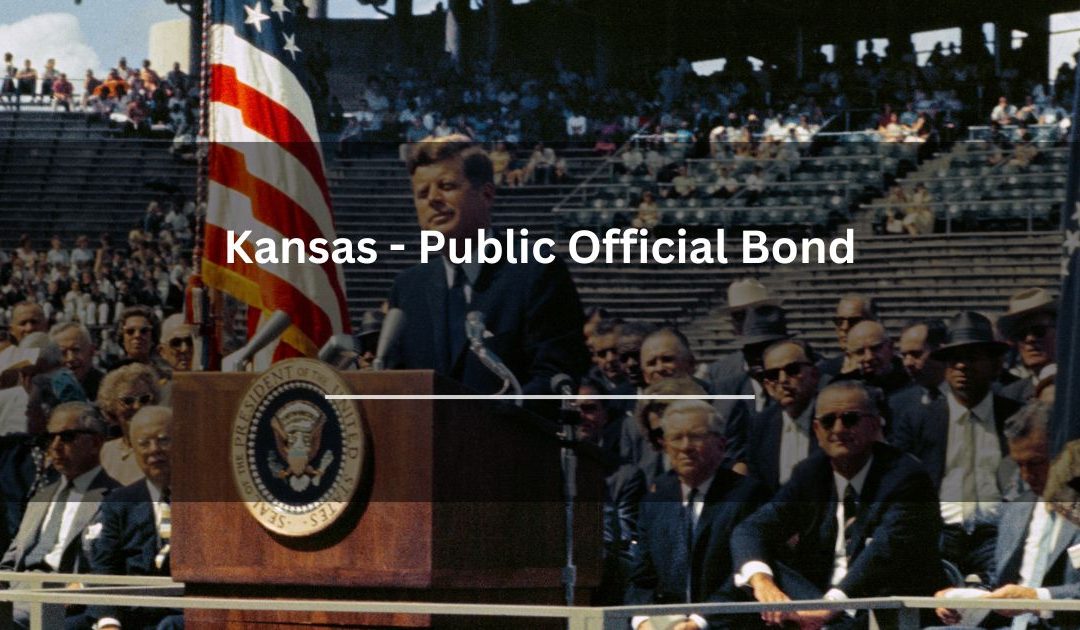Get an Instant Quote on Public Official Bond
Introduction
Public officials hold positions of trust and responsibility, making ethical conduct a priority. In Kansas, individuals appointed or elected to government positions must secure a Kansas – Public Official Bond to protect against potential financial mismanagement, fraud, or failure to perform official duties.
This surety bond acts as a financial safeguard, ensuring that taxpayers and government entities do not suffer financial losses due to an official’s misconduct. Unlike insurance, which covers the official, a public official bond is designed to protect the public by guaranteeing that officials follow all legal and ethical obligations. Like the Kansas – Supervised Loan/Lender Bond – NMLS and the Kansas – Notary Bond $12,000 without E&O Coverage, securing this bond is vital.

Common Misconceptions About Public Official Bonds
We’ve noticed that some public officials believe that this bond serves as personal liability protection. In reality, it does not shield them from legal action but rather ensures that the public has recourse if an official engages in misconduct.
Additionally, some assume that all public officials require the same bond amount. Kansas determines the required bond amount based on the official’s role and level of responsibility. Local municipalities may impose additional bonding requirements.
How to Obtain a Kansas Public Official Bond
Based on our experience, obtaining a Kansas – Public Official Bond requires a few critical steps:
- Determine Bond Requirements – Each public office has unique bond requirements, set by Kansas state laws or local ordinances.
- Find a Licensed Surety Provider – Officials must purchase a bond from a surety company authorized to operate in Kansas.
- Submit Bond Documentation – The completed bond must be submitted to the appointing authority or government agency before the official can begin duties.
- Maintain Active Bond Coverage – Public officials must renew their bond as required by law to maintain compliance.

Regulations Governing Kansas Public Official Bonds
What we’ve discovered is that Kansas state law mandates bonding for many government positions, ensuring public accountability. Key regulatory statutes include:
- K.S.A. 75-4101 – Requires specific public officials to furnish surety bonds before assuming office.
- K.S.A. 19-503 – Mandates county treasurers to maintain an active surety bond to protect public funds.
- K.S.A. 19-805 – Requires sheriffs to post bonds before performing official duties.
- Kansas Municipal Code – Allows cities and local governments to require bonds for appointed and elected officials.
Each position carries different bond requirements, ensuring adequate protection for public funds and services.
Risks of Not Complying With Public Official Bond Requirements
In our observation, failure to secure or maintain an active bond can lead to significant consequences, such as:
- Loss of Office – Officials who do not provide the required bond may be removed from their position.
- Legal Liability – Officials may be held personally responsible for financial losses resulting from misconduct.
- Fines and Penalties – State or local authorities may impose fines for non-compliance.
Government transparency and accountability are core principles of public service, making bonding an important regulatory requirement.

Benefits of a Kansas Public Official Bond
We’ve learned that obtaining a Kansas – Public Official Bond offers several key advantages:
- Public Trust – Ensures officials perform duties ethically and responsibly.
- Financial Security – Provides compensation if an official causes financial harm to the government or taxpayers.
- Legal Compliance – Meets Kansas regulatory requirements for holding public office.
By securing a public official bond, government employees and elected officials demonstrate their commitment to serving the public with honesty and accountability.
Kansas Bonding Laws for Public Officials
Kansas enforces strict bonding regulations for public officials through statutes such as:
- K.S.A. 75-4101 – Requires surety bonds for state officials and employees handling public funds.
- K.S.A. 19-503 – Mandates that county treasurers maintain bond coverage to safeguard government finances.
- K.S.A. 19-805 – Specifies that Kansas sheriffs must post a surety bond before taking office.
Failure to comply with bonding laws can result in disqualification from public office, legal consequences, and financial liabilities.

Conclusion
We’ve come to appreciate that a Kansas – Public Official Bond is more than just a regulatory requirement—it is a commitment to integrity, accountability, and financial responsibility. Public officials play a vital role in government, and this bond ensures that they uphold ethical standards while protecting public funds.
Swiftbonds provides Kansas public officials with fast, reliable bonding solutions to meet state and local requirements. By securing a Kansas Public Official Bond, government employees and elected officials can confidently serve their communities while maintaining compliance with state regulations.
Frequently Asked Questions
Who needs a Kansas Public Official Bond?
We’ve often noticed that elected and appointed officials, such as county treasurers, city clerks, and sheriffs, must obtain a public official bond before assuming office.
How much does a Kansas Public Official Bond cost?
We’ve found that the cost depends on the required bond amount and the applicant’s financial background. Surety companies assess risk factors when determining premium rates.
How long does a Kansas Public Official Bond remain valid?
We’ve often noticed that bond terms vary based on the position. Some officials must renew their bond annually, while others may have multi-year bond terms.
Does the bond protect the public official?
We’ve found that the bond protects the public and government agencies, not the official. If a claim is filed, the surety company may pay damages, but the official must reimburse any payouts.
Where should the Kansas Public Official Bond be filed?
We’ve found that the bond must be filed with the appointing government agency or state office before an official can take office.


